#how Isayama write background character
Text
Why I love how the “background characters” is written in Aot
Almost every main and side character in Aot has a chapter or episode dedicated for them in some kind of way. Which is not a special thing, as many other animanga does the same. But what about background characters? Aot sure have a lot of them. I’m gonna write this dedicated to Nanaba and Frieda.
It’s not a new thing to say that Isayama has the ability to turn one’s perspective for a character with just one scene. Say Kenny, we don’t even get his full backstory, yet his deathbed monologue tells us everything we need to know about his character. Ymir, she really really have a special place in my heart. I remember crying when I watch her in the paths with the ost playing, mind you I did not even cry when Erwin died. But there are also other characters that’s like Reiner, Mikasa, Eren, who’s character needs develop along the story in order to perfect it. I don't think characters who are written with steps better, because those are for the main and side characters.
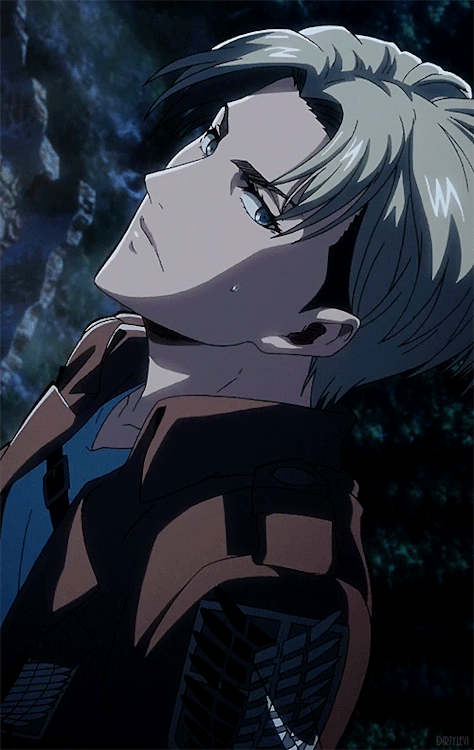
Background characters on the other hand, need to have informations about them known to the reader in just snippets of their screen time. Let’s pick Nanaba. We only have this character on screen for like how many episode? 3? 4? And even then none is like a dedicated episode for her. Yet we know about this character. How? Just a few lines from one can show a lot, and this technique is use by Yams in a marvelous way.
Similar to Kenny, we get Nanaba’s character seconds before her death. It was shown when Nanaba’s limbs were already ripped off, and the titans devouring her alive. Her last words “I won’t do that again I’m sorry! Father save me!” is so traumatic and devastating, how can one being eaten alive can remember her days back when she was still with her father. Her fear and hopelessness when she was abused is probably similar to her feelings now when she was about to die. Her abuser harms her, yet she doesn’t have anyone to call out for help to, she calls out that same abuser.
From that alone, we can guess Nanaba’s character. Nanaba may feel trapped during her childhood, yet she feels like she’s born for more than just.. this. The walls surrounds her also reminds her to this so Nanaba joins the survey corps to venture out and discovering new informations. It could also be an influence from a dead family member, say her mother. Because she did not call out to her name during her last seconds, in which that last seconds are a calling back to her childhood. This is all we can get from her last words, I think if we can get ONE spin-off for a background character, I would pick Nanaba. Sure Miche is interesting, we also have Mina, there’s Lobov, but somehow she’s the one who has most potential imo.
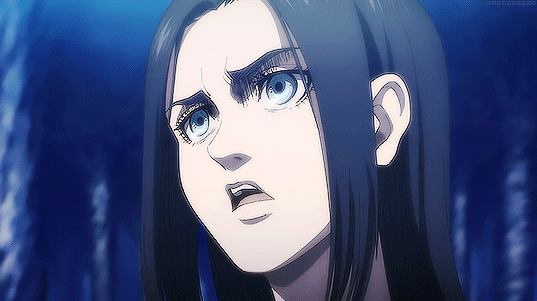
Then let's go to Frieda. For her, we have more information regarding to her character. Frieda’s promise to her father before she inherit the titan, “I won’t let the ghost of my ancestors affect me!”, then her reaction to Historia saying she wants to be her, tells us everything we need. Frieda, who sees Uri, probably have dreamed to change the way the Eldians inside the walls are living. She may or not may have know the truth via Uri, but it’s not a mystery that Frieda have a will to set her own path and change the current world from her last words before becoming a titan.
But unfortunately, she still is not strong enough to defeat the will of the first king. That’s not her fault ofc, but it may result to some kind of self hatred, insecurity, or the feeling of failure. It answers why Frieda freaks out when Historia say she wants to be her.
And no, Frieda still have this will living inside of her, it is obvious when Grisha suggest to free the Eldians minutes before he massacre the royal family. It was shown that she’s about to agree but her eye color then change, showing the influence of Karl Fritz. Such a tragic character, I’m genuinely feels sad when she have her life cut short. Uri may be curious, thus wants to inherit the founding, but Frieda is different, she wants to set her own path and change something (obviously Frieda see how walldians are living and ofc she’s not happy with that). The will of the first king is also the reason of her defeat against Grisha, because she has been influenced by Karl Fritz’s surrender.
#nanaba#nanaba analysis#aot#snk#Shingeki no kyojin#attack on titan#side characters#main characters#background characters#how Isayama write background character#frieda reiss
25 notes
·
View notes
Text
Alright, so, I wanted to write a little here about the new story from Isayama coming out, and address a few things. Before I get to that though, I want to say how special I think this is. Unlike some of the complaints I'm hearing about regarding the story being about Levi, and it being "unnecessary" because we supposedly already know about Levi's childhood, well, no, we don't. We don't actually know a whole hell of a lot about Levi's childhood. People don't realize that, in the main canon, we never actually get a real look at Levi's childhood Underground except through a handful of panels, all of which aren't from Levi's perspective at all, but from Kenny's. We get no insight whatsoever into Levi's mental or emotional state, into what he's actually thinking or feeling. Again, it's all from Kenny's POV, not Levi's. So how anyone could say that 'we already have Levi's backstory, we don't need more', blah, blah, blah, is beyond me. You're wrong if you think that. We're finally going to get a look at Levi's life growing up and finally get a look at how those events actually shaped him and affected him. We could only engage in extrapolation before, based off what little we did know. Levi's voice here is important to acknowledge and hear, because it's the voice of a child growing up in extreme poverty and violence. Levi was a victim of social indifference and disenfranchisement. He was a victim of persecution and poverty and violence. And we've never, before now, gotten the chance to hear him, or hear what those experiences did to him. We've only gotten to see the end result. So anyone saying 'we don't need' to know more about Levi's childhood, again, you're dead wrong. You might as well say that it's not important or necessary to hear the voice of any child who's suffered the things Levi has simply because you know the basic outline or generalized facts of that child's life. Get the hell outta' here. Yes we do. I can scarcely think of anything more important.
Secondly, for anyone whining about the story being about him and not about one of the other vets, you have to understand, Levi is to the vets trio as Eren is to the EMA trio. He's the focal point. He's more than just a side-character, or a supporting character. Levi is, in many ways, an embodiment of some of the most core themes of SnK. He's representative within the story of some of its most essential messages. He's just as vital to the story as Mikasa, or Armin, or even Eren, in terms of understanding its thematic thrust. He's as much of a main character as Mikasa or Armin, in many ways. So a greater exploration of Levi's childhood, through Levi's perspective, is vital and important, I think, to further understanding the whole of SnK.
Anyway, with that out of the way, like I said, I think this is really special. I think it's amazing that we're getting more background on Levi, when for all intents and purposes, it seemed Isayama was done with SnK. People should be grateful, instead of whining as usual because they didn't get exactly what they wanted. Jesus. If the story had been about anyone else, I wouldn't have complained. But Levi is a special character. There's a reason he's so popular. And it isn't because he's "the strongest" or a bad-ass, or "cool". It's because he's an incredibly deep, layered and complex person, a character that connects with so many people because there's something intrinsically real about him. He is, in many ways, what we all wish we could be. He's a genuine hero. Someone who's suffered immensely, but who, despite that suffering, not because of it, is still a deeply good and kind man. He's someone who didn't let the cruelty of the world ruin him, or corrupt him, despite him personally experiencing more of that cruelty than really any other character in the story. And so Levi is in many ways representative of the story's hope. Of how goodness and kindness can still exist, even in the face of such overwhelming darkness. Even in defiance of that darkness. Levi overcomes in a way no other character in SnK does. He experienced and lived through the worst humanity had to offer and still came out the other side as the best humanity has to offer.
So that's why it's important for this story to be told. Seeing Levi live through the horror of his childhood, but within the context of knowing him to be a genuinely good and kind man, of him being a genuine hero, will drive that theme home. That the world's cruelty and the cruelty of other people doesn't have to end with us ourselves also becoming cruel.
Anyway, I don't care what anyone says. I can't wait. And I know the vast majority of fans can't wait either. If you're disappointed the story isn't about some other character, fine, fair enough, but don't shit on other people's excitement, and don't shit on Isayama because of it. We're lucky to be getting anything extra from him at all. Also, I don't know why anyone would be surprised that the story is about Levi, since Isayama said months and months ago, after he was asked if he had any plans to continue AoT, that he had a story specifically about Levi that he wanted to tell. This isn't out of nowhere, and this isn't just to capitalize on Levi's popularity. This is something Isayama wanted to do.
74 notes
·
View notes
Note
Frankly, I've always found it strange, myself included, why Levi never mentions Isabel and Farlan. For example we don't even see them in the flashbacks where he remembers his comrades. But if I had to think of the most logical reason I could think of, it's more likely that it's because they're not characters of Yams own creation. No Regrets is a script that Yams commissioned someone else to write for the Levi background, a spinoff that was not written by Isayama himself, and the characters there are not Yams characters, except for Levi and Yams characters.
In one of the interviews I read about No regrets, I read that Isayama wanted this story to be written/drawn because he wanted a spinoff that was more about how Levi joined Survey corps. That's exactly what it is, if I remember what was written correctly. Maybe you've seen it too. My point is this, Perhaps the reason Isayama never mentions Farlan and Isabel in his own story is because they are not his characters, but also because both Farlan and Isabel and No Regrets itself, are more of background tools on how Levi joined Sc.
Hi! How are you?
Yeah, I think that's a very possible and logical answer. I would 100% believe that would be the reason if other characters were mentioned more frequently. I would be like, "Why does Levi constantly talk or think in this or that character and not Farlan and Isabel?" But overall, I still kinda stick to my idea that we hardly even see any other "remarkable" characters as "flashbacks" from the veterans, and we never hear even Levi mention them. Not just Levi; almost all the characters do not mention other characters overall.
I dare to say that's mostly an "economical" situation. Probably Isayama wasn't allowed to have any extra scenes or do "fill up" chapters to showcase other characters talking about their lives, their thoughts, etc. Like, as an example, I can't recall a single chapter in the manga or anime where Erwin talks about Mike, for example, and it's well-known that they were very close. Hange is the same. I hardly think that Levi or anyone actually actively thinks or mentions other characters in the story unless it's an "emotional or plot-wise" moment, like recalling fallen comrades, like Marco, etc.
I think that was mostly my point of view on the issue. Levi doesn't think about Farlan or Isabel, but because Levi or any other SNK character thinks or mentions other characters beside strict plot-wise necessity, and it's obvious that Farlan and Isabel aren't "plot-wise" necessities. I personally think that most of the "relationships" between characters can be "assumed" by how they interact in "spin-offs" like chibis and "junior high." I think they serve a bit to fill up that void with also the "game's extras stories etc."
Which, and this is already me rambling, I had always found it strange that it's showcased in official art, chibis, junior high, etc., that the veterans were rather close, but during the Uprising Arc, Levi mentions Kenny to Hange and they knew absolutely nothing about him. I think it would have been a nice touch, not only for Hange but for any "veteran," if Levi decided to be "100% honest" about his childhood, like telling being raised by Kenny, they could act like, "You mentioned before a bit about it but I never imagined you were talking about Kenny the ripper." A sort of "oh, you told us a bit about your past but never in detail and now that's plot-wise important, we get the details, we understand it a bit more because we are close to you than the rest but that 'extra information' isn't important enough for the reader to be aware of it but my knowledge about it showcases my closeness to you" sort of thing? I don't know if that makes sense; that's what I mean that for me Isayama lacks a bit in the writing relationship departments because those little details are so subtle but mean so much.
Anyways, the good thing is that we can fill that void with fanfics!
#snk#shingeki no kyojin#captain levi#snk levi#levi#levi aot#attack on titans#attack on titan#levi ackerman#aot
15 notes
·
View notes
Text
because I refuse to keep this going any longer than it needs to, this is my last post addressing this whole thing. Mainly because the disrespect to myself and other black writers on this app has been completely unwarranted and far out of hand. First off, this entire situation could have been avoided had certain opinions been kept in the drafts or amongst themselves because regardless of how you feel about someone’s writing/portrayals of a character, we all are different, we all have to find our niche and grow into it. I’ve been writing since I was 13 and adult me would laugh at the shit I used to put out. And hell, vice versa. The entire take was rooted in anti-blackness, jealousy and respectability politics. Plain and simple. Which is hilarious considering that said character in question didn’t abide by the respectability politics in his own verse. The boy’s daddy is a doctor and he runs around picking fights he can’t win, sticking guns to his head and all that other shit. Rather than accepting that yall’s form of expression is not the status quo nor is it the only way, you chose to attack an entire subset of other writers to make yourselves feel less inadequate. To tiptoe and tap dance for an entirely different audience who we’re not even writing for. Nor trying to appease. (side note: I have hella mutuals who don’t look anything like me and may not be able to relate to what I write about and STILL love it. And vice versa.) As someone who’s had to deal with harassment and hatred on every other facet of the internet, simply for existing, so much so I’ve given up on a lot of other passions I love. I’m not doing it here, sorry. In a community that I finally felt accepted and free to express myself, as well as met an amazing group of people who I look up to, feel close to and love more than anything. I’m grateful for this space and the people in it. I’m grateful to log in here everyday and see so many creative minds of all races, backgrounds, etc. on here just sharing their love for fandom and their favorite characters. Without people being worried about names and followers. At the end of the day, if y’all want to keep beefing and throwing subs about figments of Hajime Isayama’s sick imagination, then you will be doing it on your lonesome. Talking to your damn selves and fighting the wall because this is ridiculous. None of us deserved to be treated like this and talked about so horribly. None of us deserved to have our already tiny community even more divided and to have all of our amazing work pushed to the wayside for drama. I’m over it, my mutuals are over it and I’m sick of it. Thank you and have the day y’all deserve.
#cherry chats 🍒#rant#my last time addressing it bc y’all make my stomach hurt#I thought we were all being delusional and dumb together#I guess not though#black fanfiction#venting bc I’m so aggravated by this
73 notes
·
View notes
Note
Hi! I've been seeing a lot of Smartpass au but I still don't understand where it comes from lmao. Are those like books that made by Isayama like a guidebook? Where do people get them? Are they considered canon? How many smartpass are there? As you can see I'm confused lol. Attack on Titan manga is the only Japanese media that I consume so I'm really familiar with the others. Hope you can help me, thanks!
Hello Anon, Smartpass was a Japanese phone app that released exclusive SnK content including side stories and character "interviews". Some of this content was later included as extras in the anime box set releases. There's an amazing audio version of the Eruri side story Crumbled Castle Gate, which appeared on an audio drama cd included with one of the season 4 (I think) box sets. The official Shingeki Smartpass website is no longer online (though you can still find it on Archive.org) but the twitter account is still there @shingeki_SP A lot of the Smartpass content has been translated and collated by fans over the years including @yusenki (Smartpass Stories), @momtaku (Snk Smartpass Content), @tsuki-no-ura (Smartpass) and @snk-smartpass.
As to whether Smartpass content is canon or not, well, that depends on your perspective. Smartpass content is official, but it's not written by Isayama himself. Presumably it was approved at some level though. I tend to see Spartpass as being part of the wider canon universe along with the anime, the OVAs, and the guidebooks.
Some of the Smartpass stories provide invaluable background and depth to the characters, such as Erwin writing love letters to Marie on Nile's behalf, so I can highly recommend exploring them if you haven't already.
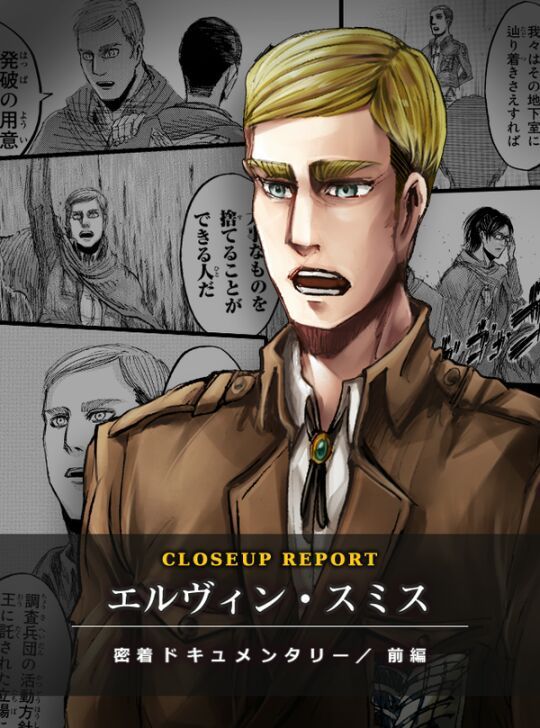

77 notes
·
View notes
Text
Attack on Titan

In her article titled “Growing up in Magical Time: Representations of Female Growth and Development in ABC’s Once Upon a Time'', Katherine Whitehurst emphasizes the use of flashbacks and emphasizes how they allow for the audience to see character change in a nonlinear fashion. Flashbacks are also used to compare and contrast the way the certain character is in the moment. The audience can better see how much a character has progressed by looking at them in the past. This idea is used constantly throughout the show Attack on Titan. Not only are flashbacks used to unearth important information at the right time, they also are used to show character growth coded by physical appearance and attitude. Whitehurt writes that “In addition to providing a back story and guide to the characters’ development, the flashbacks rationalize characters’ behaviors and relationships in the present.” (7) The characters in Attack on Titan are better fleshed out through flashbacks that provide the audience the ability to see the personal growth a character has undertaken.
How does the series form and content inform the relationship of female physical and emotional growth and development?
Attack on Titan as a series has many important female characters that round out the ensemble and have been praised for their contributions to the story. Isayama has been praised for his depiction of female characters as well rounded and multi-faceted in an anime considered to be shonen/seinen. One of the characters who has very apparent development throughout the story is the character of Hisotria Reiss. First known to the viewer as Christa, Historia is a good example of the journey from timid, obedient girl to one with her own agency and ability to be selfish. In season one, the audience is first introduced to Christa during the training arc in which we are able to learn more about the ensemble cast of characters. She is shown as kind, and selfless, with her personality almost too good to be true. She goes out of her way to help Sasha (one of the cadets) with food and water after her punishment. This moment establishes her type of character to the audience, and for the remainder of season one we only see Krista as a pure character.
Throughout the show, the audience becomes more aware of the way things work in this world. You must be cold and use everything to your advantage in order to survive. Season 2 moves her to a more central role and strengthens her relationship with Ymir.
youtube
The clip shows that Christa is not saving Daz out of the kindness of her heart (the persona that she wants others to see). She wants to die a hero. Ymir knows Christas true identity and makes her promise that once she reveals her true name she will live her own life and not someone else's. After a sacrifice from Ymir, Christa reveals her name is Historia. This is her taking one step into accepting herself and not hiding behind the idea of someone. In season 3, Historia is revealed to be the true queen of the walls and the current king is a fake. With Ymir gone, she is forced to finally accept that she's been putting on a persona. She states that she will now be showing her true stupid self. This change makes her feel more lifelike and relatable and shows that she is no longer hiding. Because of her royal blood, Historia is able to take control of the Founding Titan.
youtube
In what ways does the series use cinematic timing to chronicle character transformations?
The series often uses flashbacks to provide more information or reveal plot twists in a non-traditional way. These flashbacks are usually important background information that fleshes out the characters experience and explains why they are the way they are. Oftentimes, the audience doesn’t know what exactly has happened throughout the story until a few seasons later when there is a big reveal through a memory/flashback. Most of Historia's backstory and growth is shown through flashbacks, sometimes through different characters' perspectives and sometimes her own. This allows the audience to slowly uncover why a character is the way they are. This is true of almost all the other characters in the show. Attack on Titan is full of mystery so the use of flashbacks and memories for continuing and fleshing out the story is particularly helpful.
How are the primary characters' ages and development coded by the characters around them?
Most of the main cast of characters are teenagers and experiencing the horrific events of being a cadet for the first time. The main characters start out as young and inexperienced and the audience watches as their youthful drive and optimism is crushed the first time they actually face the titans. As the story progresses and the characters age and start to grow up, their experience in fighting the Titans contribute and shape their growth. During most of the flashbacks in the series, the character that is the main focus, is often the only one who is young. They (especially Historia) are often surrounded by adult figures which tend to emphasize their youngness and naivety. The time skip towards the end of the series is also a big way that age is shown in the show.
In what ways does the series reflect narratives of youth represent narratives of adult functionality or dysfunctionality?
In the beginning of the show, the main cast of characters are young teenagers and display youthful idealism in the way they try to fight titans. They are not aware of the horrors that wait outside the walls, believing that their training is enough to keep them alive. This idealism is contrasted with the older characters of the series who continuously emphasize the harsh realities of the situation. The world inside of Attack on Titan is full of adults perpetuating a dysfunctional system of living. They've built society up to be full of secrets, corruption and power struggles showing that adult authority figures aren’t portrayed as functional or effective. The idea of youth rebelling against a corrupt and oppressive adult society is used often in Attack on Titan and is a driving force for many important plot points.
How does the series use the fantasy genre as an area for framing virtue and villainy?
Attack on Titan challenges the traditional narratives of good vs evil and blurs the lines between virtue and villainy often. It shows the worst parts of being a human and what war does to a person and their morals. The series is filled with morally ambiguous characters and the characters that we come to see as “heroes” commit morally reprehensible acts for the sake of “the greater good” while the characters are labeled as the villains often have redeeming qualities and justifiable motivations for their actions. The story is interesting to follow as a viewer, because there is a big shift in the side that the characters view as “the right side.” At the beginning of the show there is a clear source of evil and villainy. The titans are portrayed as horrific creatures who don’t have any ability to think and feel. They are driven by the simple thrill of the kill; killing and eating people despite having no need to consume food to live. However as the show continues, more and more is revealed about the titans and the strict line between good and evil begins to be blurred. However, while the titans pose an extreme threat to humanity, the series also highlights the internal conflicts with humanity. The actions portrayed by all sides of humanity and the morally questionable decisions made by the characters show that the conflict is not black and white. Even the humans (who should be considered as virtuous in this context) commit despicable acts in the sake of self-preservation and ideology.
Discussion Questions
In what ways does the fantasy genre allow us to relate to characters in unexpected ways that stories set in real life do not?
Does animation make it easier for characters to be one dimensional or represent a specific trope in television?
How does the form of animation contribute to the fantasy genre? Are some stories better when they are told through animation?
@theuncannyprofessoro
14 notes
·
View notes
Note
Isayama is not the best at writing romance. I wonder what he would do if there would an alternate universe where Hange and Levi are canon. Maybe drawing them together and Hange getting blushed after asking to run away and live together 🤡 haha, jokes aside, I don’t imagine him drawing them a sloppy kiss…I think he would choose something more symbolic. It makes me laugh Yams has never talk about Levi and Hange’s relationship and it’s still my favorite along the series, even more than EMA lmao.
That's it, that's the point! We love levihan bc it's not canon lmao
But for real, all the ships he has made canon weren't built as well as they could. I feel like yams was rushing with the manga which left all of the relationships underdeveloped. But oh well.
When it comes to levihan's alternative universe, i think it'd be pictures of them living somewhere in the forest, like hanjo getting back from the hunt and Levi sitting and watching them from the porch. And thinking of that platonic ending for them makes me so happy uwuwuwu
Bc after seeing how all the couples have gotten together I'd rather see platonic LeviHan lmao
And I can relate to what you said abt liking these old hags more than EMA. For some reason I'm always getting attached to the adults and older characters more, idk why. It happens to me whem I'm watching jjk, mha, and aot definitely. I cannot give as many fucks about the kids which honestly is a pain bc the adults are almost always in the background and don't have as much screentime.
#my initial response was so full of shady stuff and hot takes abt the manga and ships but i decided not to choose violence today lmao#bamask
23 notes
·
View notes
Note
About the anon defending Annie. The Armin part was totally unnecessary. Why do people have to picture Armin as heartless in order to defend other characters. It is possible to defend Annie without doing that. Each character processes their regret differently and Armin didn't stop thinking about the attack and even talked about it to Anni3 when she was in the crystal. He WAS regretful and heartbroken imo.😞 Maybe I am being too sensitive but I am still not over the group of people on X (twitter)who genuinely think he is a psycho and his good traits are just a facade. I know he has his darkness but many act is if that darkness is all there is and the good is just something not inherent to his character. I don't like that. 😞
I totally get where you're coming from anon and I agree. We've been shown multiple times that what he did weighs heavily on his conscious. But I think the other anon was primarily talking about the fandom's attitudes rather than the characters themselves
There have been COUNTLESS people asking for Annie's redemption arc and how she got off easy and wasn't made to "suffer for her sins" which is the point that I was trying to criticize
It's like @moonspirit mentioned in her tags on the same post, Armin is just better at regulating and compartmentalizing his feelings, so to people with little to no reading comprehension skills, many are choosing to call him a psycho path when he's one of the most empathetic characters in the series
What I like particularly about AOT is that it lets characters with different personalities and backgrounds handle similar experiences differently without ridiculing any of them. While the plot is phenomenal, I think Isayama's writing shines when it comes to developing characters and making them interact.
6 notes
·
View notes
Note
If you collect all the reasons why you like rivamika?
Thank you for your question, Anon 😉
I hope there won't be too many spelling mistakes!
[MANGA SPOILER]
.
.
Make me like Levi.
Perhaps an original reason but a Rivamika scene made me like Levi. Yeah… when I started AOT, I didn't do shipping and I didn't like Levi. For me, he was just another badass character, cold, who did not express any emotion. Typical shonen character, seen and reviewed. How boring.
Then, I bought AOT volumes in colossal edition and I reread the manga. (side note : The colossal edition is super cool because the panels are obviously bigger and the paper is smoother and whiter, I find this edition more qualitative so I recommend!) So, I reach the chapter 30, the first real interaction between Levi and Mikasa and I see this panels in a very big format :
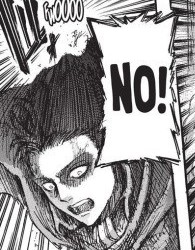
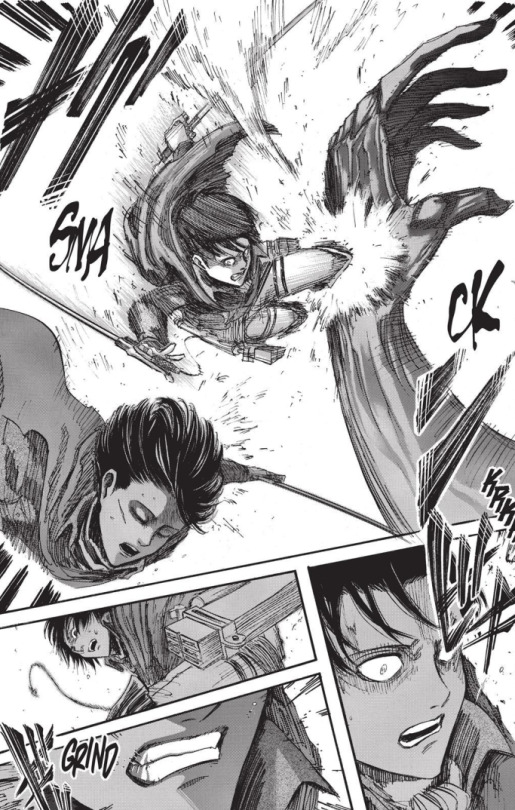
I can't really explain it well, but something clicked in me when I finally saw some real expressions on Levi's face. From that moment I got interested in him and started to like him, then discover that contrary to what I thought at the beginning Levi was a character with an interesting psyche and background. (Although I think it's a pity that Isayama didn't exploit it further… But it' s also the manga format that wants that, it's more limited than a novel.) He's a gray character who can be capable of committing heroic acts as well as terrible and even vicious things. He's a character that is very interesting to analyze and to write about. In the end, he became my favorite.
Levi's discreet interest in Mikasa.
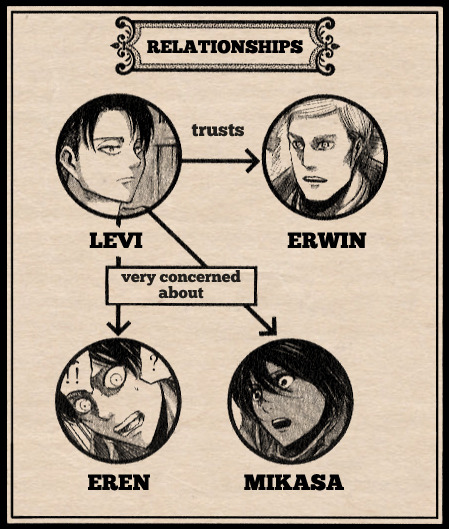
I like how Mikasa managed to pique Levi's interest. I always found that sometimes she was ignored or put aside by her own friends so I really appreciate the fact that someone paid attention to her and is concerned about her.
Then, there are his stares on Mikasa and speechless!Levi :
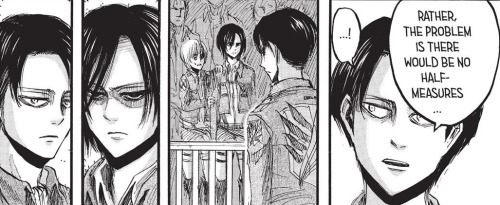
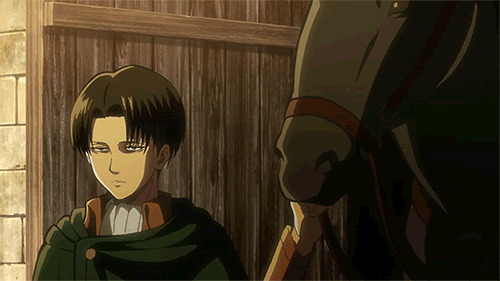
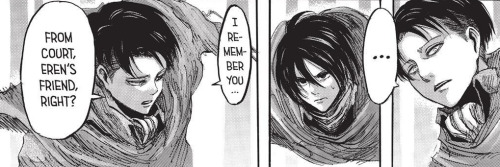
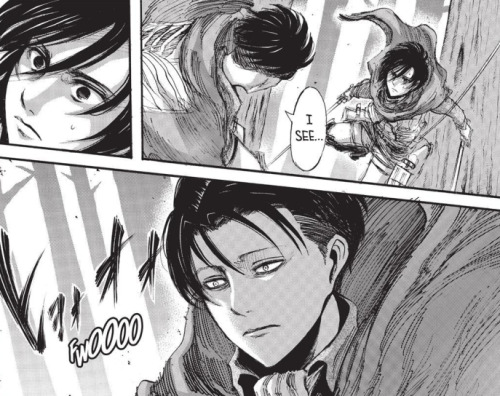


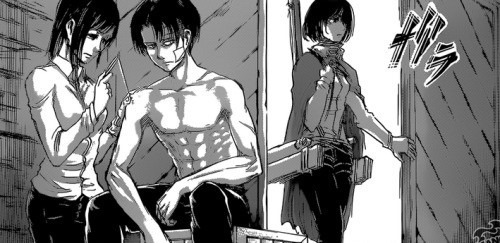
Levi wants to give meaning to all the sacrifices that have been made. Without it, all the people he lost will have died for nothing. It's personal but at the same time it gives him a selfless side, which closes him off a bit in a rather heroic character despite his flaws and his darkness. So it gives me the impression that we are dealing with "Captain Levi" most of the time, a closed person who is only interested in what might serve his noble cause. But his interest in Mikasa, although it's a bit professional, also seems rather personal, an interest he has as just Levi, as a person.
And, with Mikasa, Levi seems to be more reserved and hesitant, which deepens his character and makes him more approachable than an always charismatic and confident "Captain Levi".
The evolution of Mikasa : from hostility to trust and care.
Mikasa with Levi goes from this :
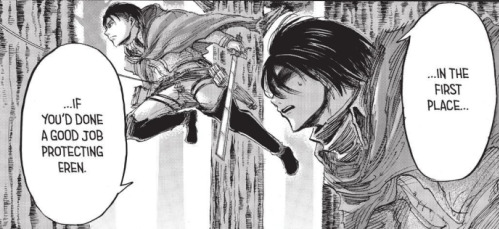
to this :

Mikasa doesn't like Levi at first, at least not since the court. But as time goes by, there is a real evolution of her opinion about him. Even though she still holds a small grudge against him, I still feel that she realizes that he isn't as bad and evil as she thought. She saw the "bad" sides of Levi first but ends up seeing his good sides later. She learns to respect him, follow his orders and trust him.
There is a real positive development that has been done (although in my opinion it has not been sufficiently exploited) and which shows that Mikasa is capable of questioning herself and revising her opinion.
Their interactions with each other.
Their interactions are really nice to see and read. They're both my favorite characters and I ship them together so of course I love the scenes they have together and I probably have a biased view because of that but… I still feel that there is a kind of special atmosphere between them. I can't put words to it, but it's like there's something deep and latent. It's more obvious in the manga, but there's almost always a game of looks between them :
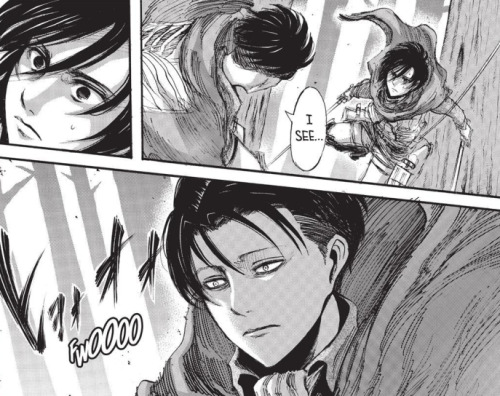
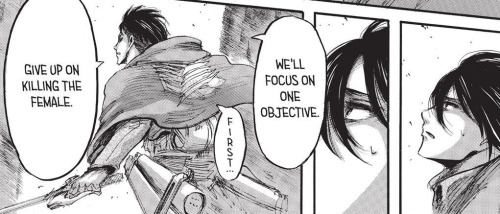
⬆ Here, I really like the focus that tightens on Mikasa's eyes.
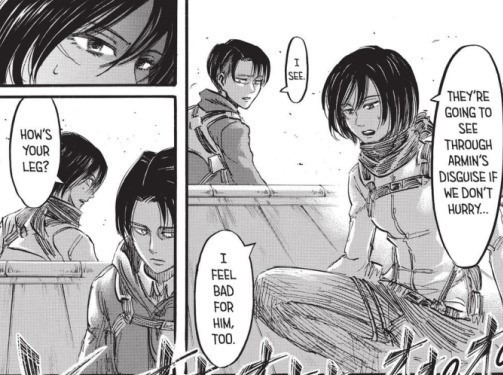
⬆ The way Mikasa turns her eyes on Levi… the way there is once again a tight focus on her eyes gives it a more intensity/meaning to them. And Levi seems to turn his away as if he's uncomfortable with it whereas he's usually the first to stare at people…

⬆ This page is simply amazing. No text, just looks. I don't know what Isayama wanted to show here, but I feel like Levi see Mikasa's distress and is surprised and confused? I would really like to know what Levi is thinking at that moment. Because right before the frame on Levi's eyes, there is Mikasa's face from his perspective. So I think I'm being reasonable in saying that it's more Mikasa's expression and tears than the fact that she draws her sword that surprises him. I think it might be because he is surprised that Mikasa cared about someone else than Eren to the point of drawing her blade?
⬇ And it's during one of their interactions that we learn a little more about each other :
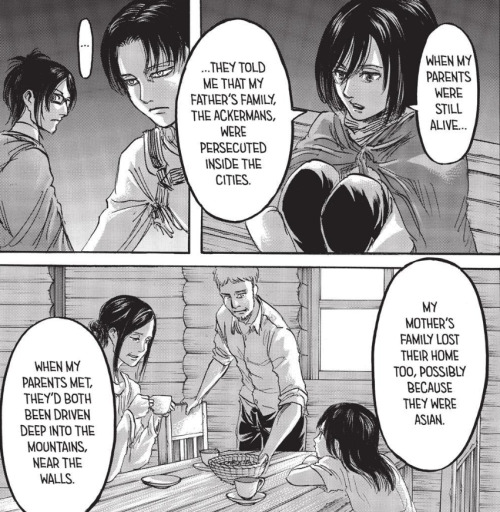

So I find that this mix adds a certain personal dimension and intimacy to their interactions.
Their dynamic.
He is Humanity's Strongest Soldier. She is the Woman Who Worth Hundred Soldiers. So if they team up, we have the right to have high expectations. And they don't disappoint. They have a confidence in each other's abilities that allows them to fight on their own without having to worry about the other, but ready to intervene for the other if necessary. Even though it wasn't shown much, they can really ally themselves and synchronize like in the uprising arc and especially at the very end, against Eren. Alone, they are strong. Together, they look unstoppable.
I liked when Mikasa was kind of Levi's right-hand soldier. I think it suits her, I would have liked to see her more in this role. It would have allowed her to learn the importance of responsibility, to put forward other of her qualities than her fighting skills. Mikasa is smart, works well and I think she knows how to anticipate the needs of others. And not being afraid of Levi, she could have told him when he was too harsh but at the same time "defend" him to her comrades because she is the one more able to understand and accept the drastic orders that Levi can give. A conciliatory role to improve understanding and cohesion between Levi and his squad. We saw all of this in the uprising arc, admittedly rather superficially, but I really enjoyed it.
I also find that Levi and Mikasa have a bit of a "Mentor and Protégée" dynamic. I always thought that Levi was trying to pass on/teach something to Mikasa. In the forest of giant trees, he tells her to not lose sight of their objective, unless satisfying her own desires overrides that. Later, he tells her to control her emotions for not mess up again. In the Uprising Arc (manga), he orders her to kill the enemies when she can, it may be an order but it’s mostly a survival advice, I think. In Season 3 part 1, he tells her that humans will also be their enemies and asks her to pass on the message to her comrades, he warns her and her friends by saying this. He asks her to calm down a few times and explains quickly why rushing is not the right thing to do.
But beyond the dynamics of "Superior and subordinate" and "Mentor and Protégée" which are professional. Levi and Mikasa also have in my eyes a certain dynamic on a more personal level : Levi see Mikasa for what she is not more not less. Although he is aware of her abilities, he doesn't mystify or belittle her. Besides, Mikasa seems more natural and herself with Levi than with the others. She has no filter, she isn't afraid to say and do what she really thinks. I find that she has a freedom with him that she doesn't have with anyone else.
As for Levi, he is still himself, Mikasa or not. However I find that he picks up in his rough way of talking when she is around surely because she tends to react. He takes his time more when he speaks to her as if he is uncertain and hesitant when usually he is very direct. To be honest, I don't know if it's because there's something about Mikasa that really makes him unsure or if it's because he knows that she's reluctant towards him and if he doesn't tone down his harshness the message won't get through as well as with the others.
There has always been an honesty between them that makes their dynamic natural, balanced and doesn't feel forced. We go from a somewhat reluctant association (on Mikasa's side) to a functional team. Obviously, it's not always perfect, but it only makes their dynamic more realistic. They don't always agree, but they talk about it, argue, try to make the other see their point of view. They are honest with each other, not afraid to tell the truth to each other and this is a good thing for me.
Rivamika is also a ship that is eligible for the romantic dynamic of "the man who looks at the girl from afar, not letting his feelings get in the way of her happiness and the girl who is in denial and not wanting to acknowledge her feelings for X reasons (bad love history, blind love for someone else)". For example, I have in mind this scene from "No string attached" for the dynamic I'm talking about (starting at 50 seconds for what I want to explain) :
youtube
It's not for the dialogue or for the characters' personality that I give this scene as an example, although "I don't need you to take care of me. I take care of myself. That's what I do." fits pretty well for a line from Mikasa to Levi (and I will pay good money to see and hear Levi tell Mikasa that she fights like a hamster!) However, it's more about the idea of the confident guy and the girl in denial… The way the girl's first instinct is to lash out at the guy and, him, just stays chill, ironic, cynical... Familiar, isn't it?
They could be beneficial to each other.
Maybe that's why I shipped them together in the first place. I really think they could have been beneficial to each other.
Levi has suffered a lot. I feel sorry for him when I started to like him so I wished he had someone to really care for him. And Mikasa takes care of others, sometimes in a rough way but she also knows how to show an incredible sweetness. And it's some of that sweetness that I want for Levi.
There is also the fact that I think Levi feels apart and I believe that Mikasa can really understand him because they share certain personality traits, have certain events in their past that are similar. Levi could find an understanding and compassion from Mikasa that he cannot find from anyone else.
Mikasa seems a bit lonely too. Not like Levi seem to be, I have the impression that she's sometimes put aside by the others without them doing it intentionally and she tend to self-effacing too. But Levi, when she speaks, he listens and don't interrupt her... I think that he could give her the right attention and respect she needs to be more confident. (Yes, for me Mikasa lacks confidence in herself, that's the reason why she believes so easily Eren when he says he hates her, it's not a lack of trust in Eren but in herself.)
And as they remain two individuals, with two different personalities despite some common points, they sometimes have disagreements as we have already seen in the manga. But this is not necessarily a bad thing. It allow them to question themselves and to evolve individually in a positive way.
Rivamika is bold.
Rivamika or any other ship than Eremika would have been more audacious, "artistically" speaking. Main characters who love each other romantically? Super original, we never saw that… I've always hoped Isayama would go beyond the standard in this matter (He did it a bit by killing Eren before he could be with Mikasa, I admit.). I was hoping he wouldn't make a romance between Eren and Mikasa, because I wanted something different and original, to show other kind of love than the romantic one. To show that people can be very important without it being romantic, it would have been more and really interesting... too bad.
But at the same time and to be honest, I like AOT as it is, I accept Eremika and understand what it brings to the story. I didn't read the manga for the romance but for the universe, the suspense, the survival story, the characters…etc. But I also see Isayama's work as an incredible support for the imagination, a nice base, good characters with which we can invent, build or deepen the relationships between them.
I am aware that Rivamika is also controversial. This is also why I say Rivamika is bold. It's a ship that has negative labels so it should be handled with caution. But there is nothing that is really an obstacle, if you think about it a little, nothing that can't be swept away with logic, facts and an open mind, but above all a distance to have when it comes to fictional characters in a fictional story, in a world that is not ours and in a time apparently prior to ours. (I won't debate it here because it's not the subject and I will only make an already long post heavier. If you are interested in my opinion, ask and I will try to make a post dedicated to this subject.)
Rivamika is the ship that inspires me the most to read or write about the development of a relationship. There is a real potential to exploit, a story to tell with twists and stakes.
They look good together.
Yes, I know it's a superficial reason, but I can't help but find that there's a certain flow that comes off of them when I see them together. It's a matter of taste.
Here are some examples to illustrate what I mean :
Manga :
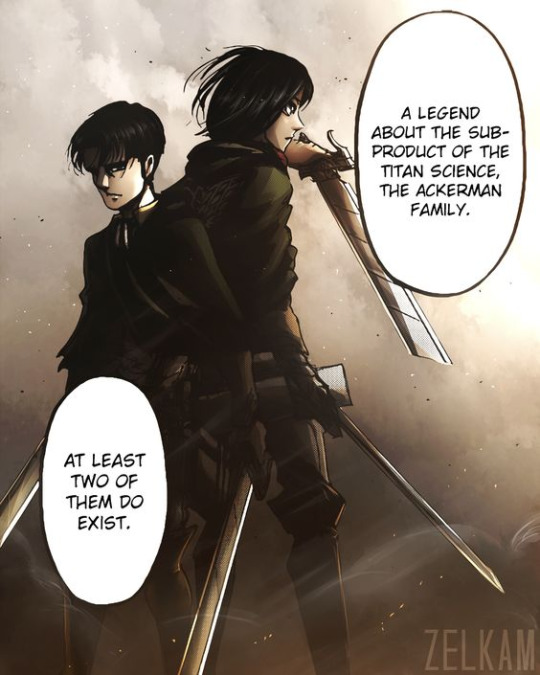
Anime :

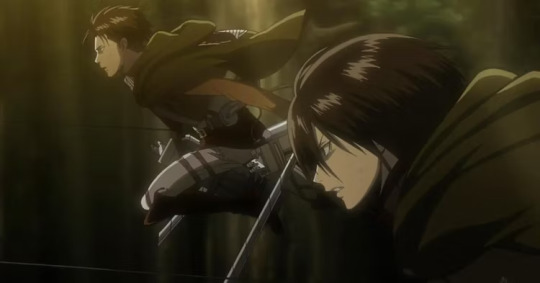
Official Art :
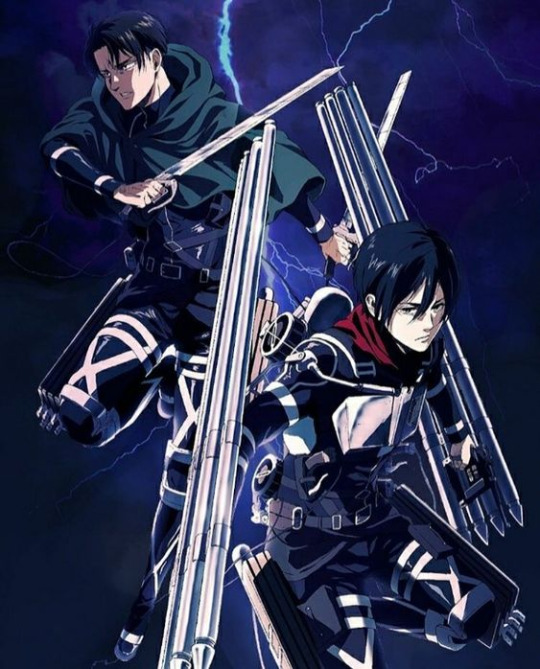
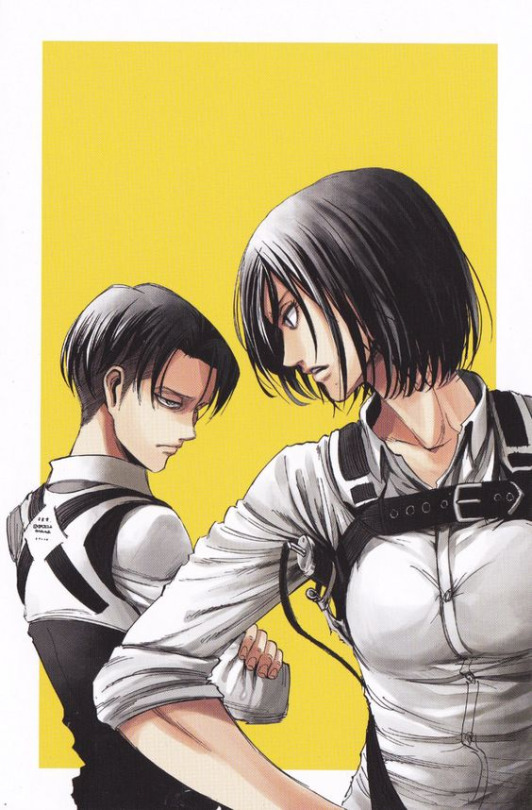
Fanart :
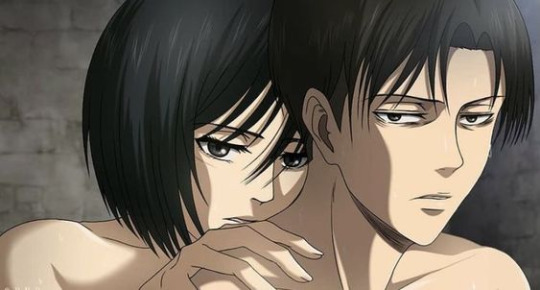
Fanart by PNR Phit chan
53 notes
·
View notes
Note
"eren isn't an average person" anon here.
i had to vent, because, after the ending, i've been seeing many weird takes about the point of snk being to show what war can do to an ordinary person, or that everyone would do the same in eren's shoes. when people aren't saying that eren was just a cornered good guy or giving excuses that there was no other way other than the rumbling.
even if i can understand where isayama was going with the ending, i feel he kinda fumbled? i really think the way he wrote it gave the fandom what they wanted the most: many ways to justify what eren did and water down/erase the bad image of eren that the rumbling left on them. i got impressed how showing eren in a slightly more sympathetic light in chapter 139 made many people yell "i knew it. i knew he wasn't the bad guy" at the top of their lungs, others even considering he was redeemed and calling him a hero, since his actions ended up saving his close friends (despite they got in real danger and almost died most part of the last arcs).
the chapter technically doesn't redeem him, but the way it was delivered made many people see eren as "just a boy" again, and that the "bad eren" was completely a facade, because they'd desperately trying to disassociate what they think the real eren is from the things he was doing post-timeskip at every opportunity. people couldn't handle that eren is everything together.
many stuff contributed with that: not showing the consequences of the rumbling properly (post-rumbling); the rumbling not affecting the 104; all the main characters alive crying eren's death and implied to visit his grave; "thanks for becoming a mass murder for our sake" - even if armin was only trying to comfort eren before his death; excessively cute eremin and eremika without a drop of real resentment scenes; ending the original 139 with mikasa thanking eren for wrapping the scarf around her (inviting the readers to remember the good things he did), and associating him symbol with a bird, a symbol of freedom; etc.
anyway, here i am venting again lmao
ps: i swear i'm not an anr enjoyer/er*hisu. i'm just an average ending hater who felt isayama got so close yet so far to deliver something memorable.
You're fine anon! Vent away. I hear what you are saying.
Where I differ is that I don't mind the idea of the ending. I think it does exactly what Isayama set out to do. Concept wise it's not a fumble. If you read the August 2017 BSM interview, that's pretty clear:
I don’t think the series passes judgment on what is “right” or “wrong.” For example, when I read Furuya Minoru’s “Himeanole,” I knew society would consider the serial killer in the story unforgivable under social norms. But when I took into account his life and background I still wondered, “If this was his nature, then who is to blame…?”
But considering the root of the issue, rather than evaluating “what is right” […] I think that’s what Shingeki no Kyojin’s ending will resemble.
Isayama was never interested in establishing right or the wrong. His goal was to write a sympathetic character who was twisted both by nurture and nature to do unthinkable repugnant things. Rather than dictate morality, Isayama's goal was to let reader determine how they felt about it. This is exactly what we've seen in the fandom with people on all sides when it comes to judgment on Eren.
But I do agree that the ending was harmed by the issues that have plagued the series as a whole - terrible pacing, inconsistent tone, and too much emphasis on the mystery instead of the resolution. This series is a case study for "interesting ideas clumsily executed". It all culminated in a speeding train wreck of an ending.
As I write those words, I want to say again, I like the concept of the ending. While the whole "Thanks for becoming a mass murderer" vibe makes my skin crawl, I don't mind the actual events that happened. If the story and the ending had been presented to me as a bulleted list, I'd think it was outstanding.
As far as the ending being embraced by the worst of humanity as a justification for their hatred and bigotry, I don't know what to say about that. On one hand I've often wished Isayama had done more to discourage that or had spoken out against it, but then I think about how it is often the goal of authors to pick at the scabs of social issues and leave them festering and open. This series might have been a gateway for some into fascism, but flip that around and it was also a gateway for exposing it. The series has made me more aware of the issues in my own country and has strengthened my resolve to fight back on things I might have otherwise ignored.
This is long. I hope it makes sense. Thanks again for sharing your viewpoint.
22 notes
·
View notes
Text
Is Floch Erwin's True Successor? (Attack on Titan Essay)

In Attack on Titan, the tragic state of the world forces characters into situations where they must act against their nature to achieve something the story refuses to give them.
Peace, Happiness, and Freedom.
Isayama writes the characters so well that many of them already realise that to achieve their dreams, they must do things they don’t want to do. But they need to.
However, there is one character who defies this pattern and willingly becomes the exact kind of prick the story needs to achieve its intended complexity.
Devils
Floch Forster stands out because he fully embraces the role of a devil, showing no hesitation when doing what is necessary. And as the story evolves, we see him also evolve, becoming more and more cruel.
This explains why many viewers dislike him.
But there are numerous characters in fiction that people hate. However, that’s not because they’re bad characters.
But because they’re so good at being bad.
Because that’s how well-written they are.
Floch fits this category perfectly and his presence in Attack on Titan offers a much-needed contrast to the more heroic and compassionate characters we're used to.
Finding His Call
What's so intriguing is that Floch's journey didn't start this way.
He was pretty much a background character that was used to highlight the stark contrast between the new recruits and our more battle-hardened protagonists.
A popular opinion is that Floch really developed in season 4, but I’d argue that he started to change much sooner than that.
Through all the tears and fear, Floch started to change when he first faced the fear of dying meaninglessly.
He confessed to being a complete coward, a trait that became evident when he faced the possibility of a pointless death.
But who could blame him? It was a miracle that Erwin convinced the scouts to ride to certain death. But that’s part of the reason he was such an amazing commander.
Floch's main drive is quite simple and relatable; he doesn't want his life to be meaningless, and he wants the freedom to choose what is worth dying for.
The thought of leaving no impact on the world terrifies him.
After witnessing the bloodshed, he understood the kind of impact he wanted to make. He desired to contribute to a significant change in the world and liberate Eldia from its nightmare.
He wanted to make a difference.
In Floch's perspective, Commander Erwin's daring actions brought purpose to what would have otherwise been utterly pointless deaths.
This might be why Floch respected him.
He despised Erwin for leading everyone to their deaths, but he also realised that someone like Erwin was necessary to survive and pave the way to freedom.
Seeing Erwin's determination to advance at all costs, Floch started to appreciate the need for a devilish leader like him.
After that mission, Floch quickly developed a hatred for anyone outside the walls who contributed to imposing this hell on them, which is quite understandable.
He survived the same mission as the others, and even if he hadn't, his opinion is as valuable as anyone else's.
Just like everyone else, Floch has the right to fight and advocate for what he believes will create the best world for him and his people. He has the right to make his own decisions.
He has the right to freedom.
He feels guilty and finds it ridiculous that a coward like him survived the massacre of Shiganshina while everyone else perished. He sees this as a darkly humorous twist of fate.
However, the reality remains that, for whatever reason, he DID survive. And this instils him with a desire to fulfil his purpose with the time he has been given and not lead a pointless existence.
So, if he was going to do anything with his life, he was going to dedicate it to what he believed was the right cause.
He believed that the only way to win was by relying on a devil to lead them, and ironically, the same person he criticised became that devil.
The Right to Choose
Eren's plans gave him what Floch considered a second chance at life, so it's not surprising that he fully commits to this path without any doubts.
However, his words also hint at another idea: he values honesty.
After his ordeal, Floch becomes very direct and candid in expressing the harsh truth.
He plainly tells Hitch that Marlow and the others who died probably regretted dying like that, and he is straightforward in saying that Levi and Eren were too emotional in their decision to save Armin.
And he does all of this during a funeral for fallen scouts.
While many would consider this disrespectful, Floch likely believes that the entire funeral is a betrayal in the first place, because it glorifies all of these deaths as heroic when, in reality, they all probably died wishing they had never volunteered in the first place.
In season 4, we see Floch tell the Jeagerists about Eren’s imprisonment, a fact that was supposed to be a secret. You could argue that he did this solely for the benefit of the Jeagerists, but I think think he believed that people deserved to know the truth about what was behind the scenes.
He thinks they have the right to decide what to do after knowing the whole story, a privilege he never had in the Shiganshina mission.
The interesting thing here is that all of this is understandable. It may be dark, and he may have grown to completely ignore and dismiss the suffering they cause on the way to their goal, but I think it's understandable if you consider the hell he's witnessed and the people he cared about who have been torn apart.
Similarly, not everyone can or wants to see other perspectives when they've experienced something like that, and this is the result. I think all of this makes him realistic, resonant, and even a bit sympathetic.
At this point, I don't think Floch is evil for seeing everyone outside the walls as an enemy. Given the things he's witnessed, it may not be the best approach, but it's not an unimaginable mindset for someone like him to have.
But I have to emphasise, “At this point”.
Because, this is where the almost coherent side of Floch falls away to reveal someone who not only has no reservations about being the person to help lead the Eldian empire, but who takes pride in it and revels in it.
He crosses the line from an understandable yet unlikable character into a genuine threat when he starts showing his borderline sadism.
He uses Keith Shadis as a symbolic personification of stamping out the old ways by beating him up without any hint of remorse.
But he could never have done all of this alone, and he was enabled by clinging to the ideal hero he believed in through an almost parasitic attachment to this devil.
The concept of devils is rife within Attack on Titan.
The story needs devils.
The story needed Erwin.
It needed Eren.
And it needs Floch.
Humanity
One thing that is crucial about Floch is that when it comes down to it, he isn't a complete coward.
He had courage.
He gathered enough bravery to join Erwin's charge, stood up to Mikasa with his newfound ideals, and didn't hold back in defending what he believed was right.
After the time skip, you can accuse him of many things, but cowardice isn't one of them. I wouldn't go as far as to say Floch represents us, partly because that's too cynical.
But he's more like someone we could become if we lived through the hell he did. He embodies the idea that this story keeps highlighting: that life has meaning simply because you were born into this world.
Even someone like him should have the freedom to choose how to live and die, and to defend that freedom, he did what he did.
He doesn't care about being kind or open-minded. He's just a regular, vulnerable guy trying to live in a way he can be proud of. Sometimes, that's all it takes to turn someone into something unrecognisable.
He represents the perspective of the everyday person and how they can be influenced by different factors. He shows how, in response to bloodshed and the desire to have a meaningful life, one can become radicalized and extreme through warfare, becoming desensitised to tragedy and unwilling to see other perspectives.
It's no surprise that someone like him emerged from this chaos.
Despite his cruelty, we can learn a lot from him. His character is so human and so perfectly flawed.
And without him, Attack on Titan would not be the masterpiece that it is.
-----
I'm really sorry this came out so late.
I hope this doesn't feel rushed. I tried to put the same amount of care and effort into it as always, but I wasn't able to spice it up with nice screenshots and quotes this time.
It's been a really tough week for me, but we keep moving forward :)
The next essay (or maybe the one after that lol) will be something super special.
As always, I would greatly appreciate it if you could check out the full video essay.
youtube
#anime and manga#aot#attack on titan#shingeki no kyojin#essay#floch forster#aot floch#snk floch#Youtube
4 notes
·
View notes
Text
Ever Since I Was Born: Eren and his Id
Ironically, after writing a very long critique of the ending, I believe I have found a way to redeem it. Isayama’s comments on the manga ‘Himeanole’, as well as the analyses put forward by @twilight-paradise88 and @cosmicjoke, led me down a very interesting path of interpretation that makes the ending - thematically, at least - justified.
In the 2017 Bessatsu Shonen interview, Isayama says this about ‘Himeanole’:
Ultimately, I don’t think the series [SNK] passes judgment on what is “right” or “wrong.” For example, when I read Furuya Minoru’s “Himeanole,” I knew society would consider the serial killer in the story unforgivable under social norms. But when I took into account his life and background I still wondered, “If this was his nature, then who is to blame…?” I even thought, “Is it merely coincidence that I wasn’t born as a murderer?”
Does this sound familiar?

Eren, like the protagonist of that manga, is presented as being a certain way since birth. From the Attack Titan’s power to see the future, we know that Eren bringing about the Rumbling was an inevitability.
The kernel of this idea is preserved in the ending. Although Eren’s motivations become more complex, the core of his being still compels him towards that act of destruction. He cannot understand it, because it is not a logical demand. It is simply the nature of who he is.
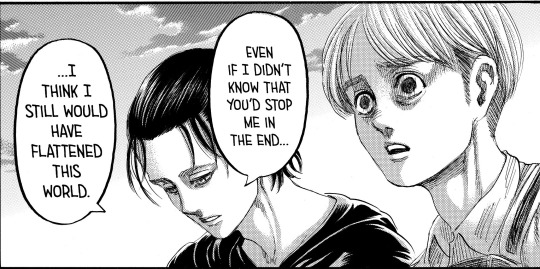


The words Grisha tells him at his birth become the driving force of his nature. Eren is, and has always been, someone who fights for freedom at all costs.


That’s why he hurls himself at titans instead of running away from them. That’s why he’s willing to commit a genocide instead of accepting compromise. He was very vocal about this desire in the Final Arc, but his friends wouldn’t take him seriously. They couldn’t understand it.


It is when Mikasa makes the mistake of claiming that Eren saved her from the kidnappers because he is a ‘kind person’ that he becomes enraged.
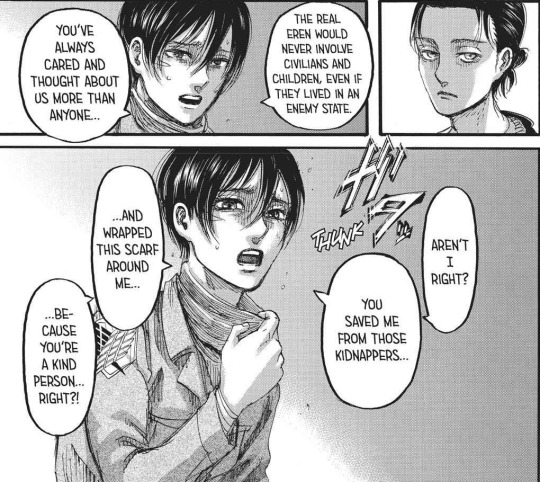
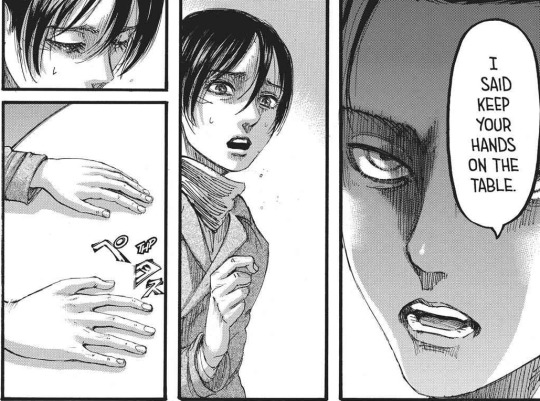
Because Eren knows the real reason he killed those kidnappers. He tells Zeke as much when they survey the scene together: he did it because ‘If other people are going to steal my freedom, I’m going to steal theirs’. He was made to act by his all-consuming drive for freedom, and not from any kindness.
Being aware of that now, he is angered that she thinks of him as a kind person; because, knowing the future, he can no longer believe that about himself at all.


As Mikasa becomes aware of this side of Eren, she remembers her romanticised memory of him rescuing her differently. She sees much more of the animal in Eren, the primal instinct for freedom pushing him to tremendous violence, even as a child.
The drive for freedom possesses Eren like an outside force. For this reason, he tells us that he’d enact the Rumbling even if the circumstances were completely different. And for this reason, when he tries to abandon Ramzi, he is unable to do so. Logically, there’s no reason to save him, but he just can’t help himself. His instinct for freedom demands it.
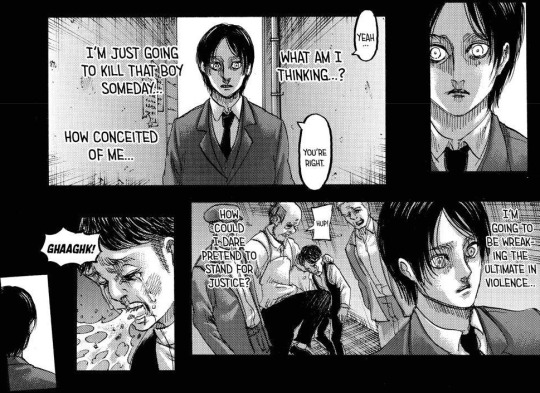
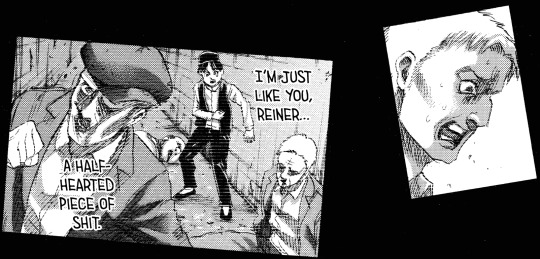
It’s telling how we don’t actually see Eren in the act of saving him. It cuts to Eren bringing him back to the camp, and then we see him save Ramzi via flashback. But the point-of-view perspective makes it feel like the events are happening to Eren, rather than being committed by him. It gives the impression that Eren disassociates in these moments as his drive for freedom overrides his self-aware consciousness. In Freudian terms, his id overpowers his ego.

If this is the case, then the above lines from the ending are redeemed. Eren didn’t understand what he was doing at that moment just like he didn’t understand why he needed to flatten the world. It was his nature, his id, taking control.
The sheer power of this id caused Isayama to criticise his own portrayal of Eren in the 2014 interview with Brutus. Isayama’s motivation for turning Eren into a ‘Himeanole’-style character may have been an attempt to justify this ‘flaw’.
I mean, these Titans show up all of a sudden, and he’s not only unafraid, but decides to go kill them? That’s just not a realistic character.
It’s certainly nothing a normal human would do. But Eren, as Isayama goes on to write him, is not a normal human.

Eren completely embodies the ideal of freedom, and for that reason, he is often seen as inhuman: both as a god and as a monster.
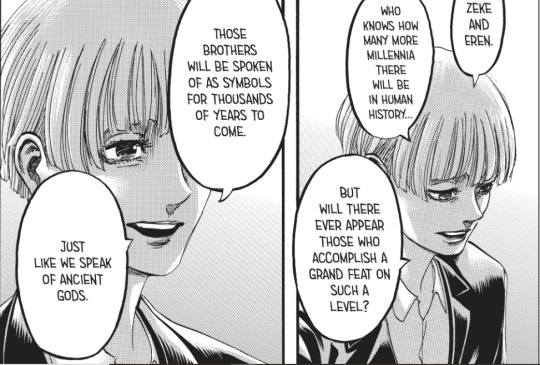
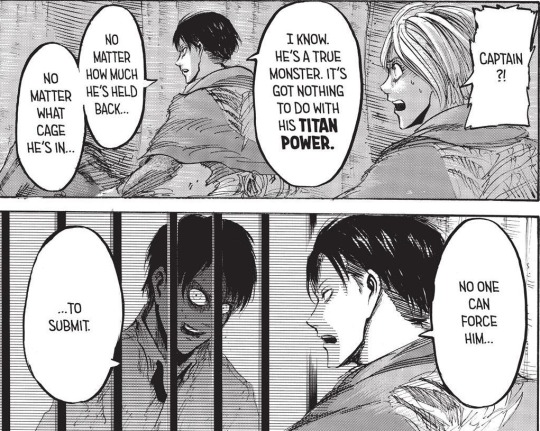
Like the ‘Himeanole’ protagonist, Eren was born as something inhuman. This monstrous quality is reflected in his titan power: and, like Eren, the monster into which he transforms is defined by its search for freedom.

Since the Founding Titan’s power obscures past, present, and future, it may even be the case that Eren was influenced by that founding drive of the Attack Titan since he was a child.
But it is not just Eren or the shifters who possess these monstrous qualities. All Eldians can become titans, and so all of them have the capacity for inhumanity. Eren is different only for understanding and accepting this fact.
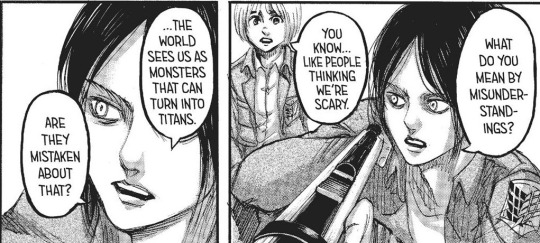
Unlike the Marleyan Eldians, who are desperate to atone, and unlike Zeke, who wants to wipe out his own people for being born as monsters that can turn into titans, Eren does not regret the fact of his birth. Staying true to his mother’s words, he believes he was born this way for a reason.


Instead of rejecting his nature, he attempted to use that inherent ‘evil’ to create a better world.
The id is a powerful tool, and without its powerful emotional energy it’s unlikely we would be able to accomplish anything. Eren’s id desire for freedom was the only way he could endure all the trials he had to go through to reach the final result.
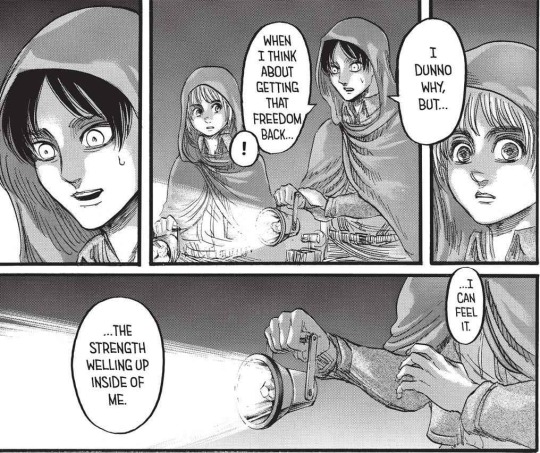
However, it’s dangerous to allow the id to roam freely. According to Freud, civilisation can only function if the ego represses the id: and indeed, Eren’s id desire is the destruction of almost all human civilisation.
In the 2018 Oita 4PM Radio interview, Isayama seems to concur with Freud:
It’s good to doubt yourself. Sometime[s] it is good not to overly believe in oneself. Everyone has a side inside of them that is a cruel person.
The cruel person inside you is your id, and it is your ego which doubts its desires. Armin considered Eren to be a ‘slave to a piece of shit’ in 112 because he thought he was yielding to that cruel person inside him. Knowing that Eren’s ego would never want to hurt Mikasa, Armin believed it had surrendered to the id.

He thought the same thing while watching Eren crush the world. Armin, the series’ prime example of the rational and moral ego, looks down on Eren for allowing his id to run away with him like this.
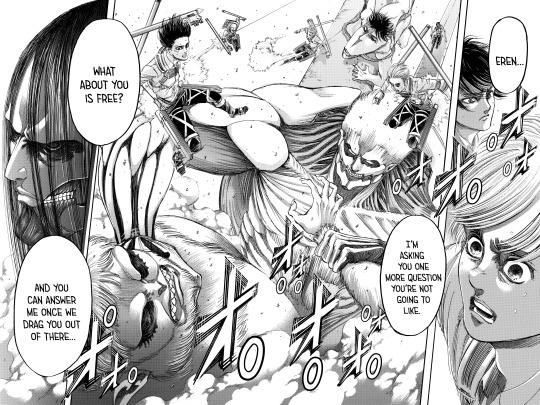
But we learn in the final chapter that Eren’s ego - the Eren which is recognisable to Mikasa and Armin - was in control all along. He was simply making use of the energies of his id to achieve the goal of his ego, the disappearance of the titan power. Although he didn’t want to die, and he genuinely did want to flatten the world completely, he denied the longings of his id for the greater good.

Accordingly, he relied on his friends to kill him before his id escaped the control of his ego entirely. Just as there was a part of Eren that grieved at his destiny, there was also a part of him that looked upon the massacre with elation.

It is appropriate that Eren’s id is represented by his child self. Childhood is the less developed, more instinctual, and more emotional stage of existence before civilisation instils us with moral conscience and the ego.
For this reason, Ymir is also represented as a child, as her id of love for Karl Fritz overtook her ego completely. It is only after her ego triumphs over her id that we see her as an adult again.

In that sense, SNK is something of a coming-of-age story. The reining-in of our id is the basis of civilisation. So far as maturity means active contribution to civilisation, it also means the taming of our id.
Eren engineered a situation to stop his id before it was too late. Otherwise, Ymir would never be able to mature and move on from the past, and instead of freeing her from her torment, Eren would join her there as a fellow slave to the id.
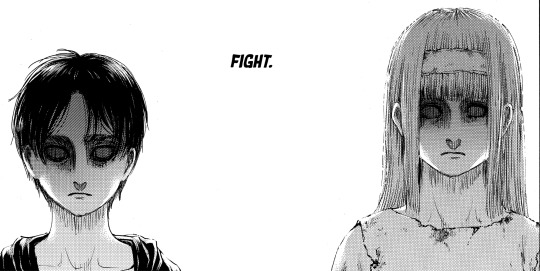
In accordance with his vision, the person he entrusted with this task was Mikasa. Mikasa would always stop Eren in the past when his id got out of control, and just so it was her destiny to kill him now.

When Armin learns that Eren had always planned to suppress his id rather than give into it, he is finally able to reconcile with him. So long as Eren prioritised selfless principles over selfish ones, the series’ mouthpiece for the rational ego can forgive him.
The continued presence of the ego in Eren’s mind is hinted at when Zeke goes through his memories. Eren points out his killing of the slavers to demonstrate his id to Zeke, but he chooses not to comment on something else that he notices.

Just as Mikasa said, Eren wrapped that scarf around her because he is a kind person. Remembering her words, Eren looks at the moment with conflict. It is proof of his own decency that his self-hatred struggles to acknowledge. It is also the side of himself that his plan seeks to uphold and protect.
Because unlike the slaver killings, wrapping a scarf around a traumatised girl has nothing to do with Eren’s instinctive drive for freedom. It was an act entirely performed by his ego. The repetition of this act in the original final panels serves to reiterate that Eren’s ego, not his id, proved to be the fundamental essence of who he was.

Although the world remembers him in fear and hatred for the excesses of his monstrous id, his friends remember him fondly for the workings of his ego behind the scenes. By ending the series with words of gratitude for the actions of his ego, rather than words of hatred towards his id, Isayama tells us Eren is redeemed.
This serves as the conclusion to Mikasa’s dilemma in determining whether it is the savage Eren or the kind Eren which is real. The alternate images flash in her mind in 112.
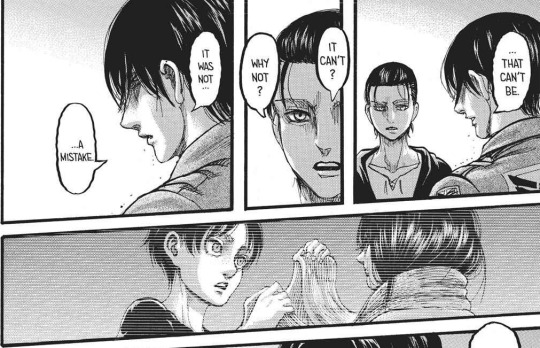

While she is forced to acknowledge the reality of Eren’s id and the fact that it must be stopped by any means necessary, she does not renounce her love for his ego.


Peace of mind comes to her with the revelation that the destruction of his id was the wish of Eren’s ego itself.
But Eren did not come to this conclusion easily. He has been torn between the two sides of himself throughout the series, unsure of whether to listen to his rational ego and heed the advice of his comrades, or follow his id and his individual intuition.

He was punished for relying on his id at Trost, when his solo forwards charge led to his near-death. On the other hand, he was rewarded with the awakening of his titan power - the id incarnate. Against the Female Titan, he regrets trusting in his comrades and decides it would have been better to follow his instincts. Once he does so, he is soundly defeated.
Notably, when Eren indulges his id, his more ferocious and monstrous aspects come out.



Eren continues to vacillate between his two selves with differing results. Just as Levi warned him, the right choice is never made clear.
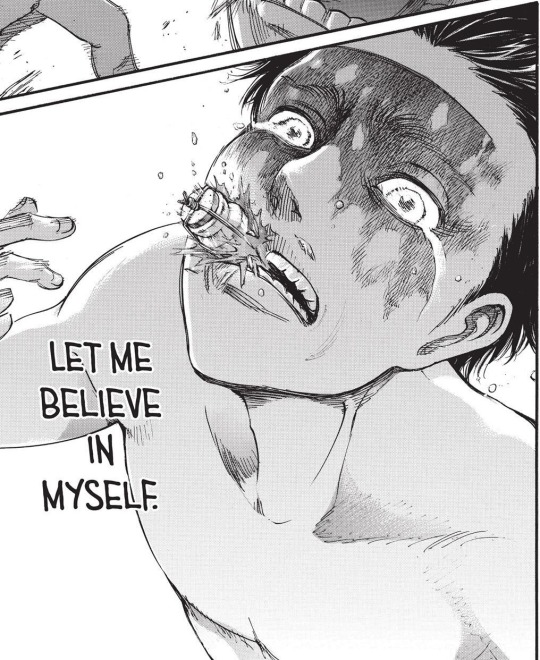

But in his plan as it worked out, he found a balance between the two. He acted on his own, but still relied on others to stop him. It is because of this balance that the optimal solution could be achieved (or so it is presented).
Put simply: follow your nature, but temper it by relying on people you can trust to do the right thing. In this regard, Eren shows himself to be a true member of the Survey Corps, who not only follow their own dreams, but also carry the dreams of others on their backs. This is best represented by Erwin.



Erwin was only able to bring humanity to this point by selfishly following his id. However, in his last moments, he chose to follow his ego and place others’ wishes above his own. Erwin died a hero precisely because he followed his nature up to the crucial point, and no further. He knew when one must be impetuous and when one must be rational, when one must be selfish and when one must be selfless.
This is the meaning behind the motto ‘Dedicate your hearts’. By all means follow your heart, but dedicate it to the service of the Survey Corps. When the time comes, you must overcome your heart, your id, for the sake of the common good. That, for Isayama, is heroism.
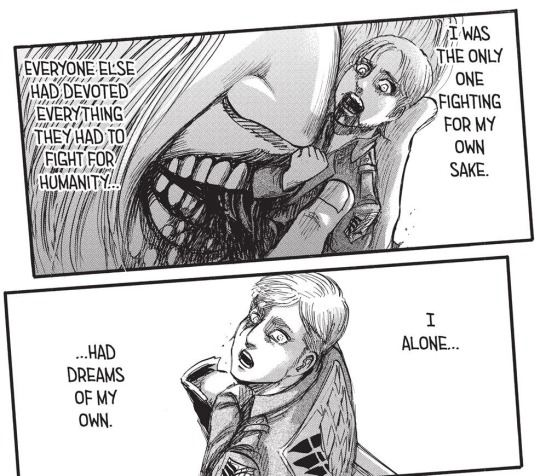
In this regard Eren and Erwin parallel each other, as do Mikasa and Levi. Both placed their ego over their id desire to live, and the Ackermans, though desperate to keep them alive, ultimately respected their wishes and pushed them towards death themselves. Like Mikasa with Eren, it was Erwin’s ego that Levi admired, and so he could not do anything to undermine its wishes. Isayama said in the 2017 Character Directory interview:
The reason Levi always operates alongside Erwin is because he interpreted Erwin’s “For Humanity’s Future” as an altruistic intention that Levi never considered himself [...] When he discovers that Erwin actually has a selfish goal like his “dream,” it can be said that he felt betrayed. However, he also recognizes that this person whom he cannot hope to surpass actually has “an innocent, childlike side that chases dreams.”
Notice the word ‘childlike’, and compare it to the image of the child Eren enjoying the massacre. Eren and Erwin both held onto their dream since they were children, and indulged that id desire well into adulthood.
For both of them, this id desire is represented as a foreign force. The way Erwin describes his dream flashing through his head when he wants to quit is eerily similar to Eren’s explanation of the Ackerman brainwashing.

We now know that there was no truth to these claims about the Ackermans. Instead, it is likely that Eren based them off his own experience of his ego trying to resist his id. Erwin experienced it too; and though it had nothing to do with her Ackerman bloodline, so did Mikasa. Selfishly following her id to protect Eren had been extremely beneficial to the Survey Corps, who needed him alive; but when the time came to kill him, she was able to overcome that desire for the sake of the greater good.
Likewise the solution to the problem of the series, the titans, comes about only when Ymir puts aside the id that manifested as chains, agony, and loyalty to an external oppressor.

Her ego had to triumph over the force of her desire in order to be free. Mikasa describes her love as a ‘long nightmare’ because, like a nightmare, it was torment she was powerless to stop. Her conscious self, her ego, was subordinated entirely to her id.
This description is reminiscent of the ‘long dream’ Eren wakes up from the start. He, like Erwin, like Ymir, has spent the course of the series stuck in a dream, his body being moved by a force outside his control. This gels well with Isayama’s comments in the 2019 Guidebook interview.
Up until he saw the ocean, he was the “slave of the story”. After seeing the ocean, he became a character that pulls the story along, and his inner psychology hasn’t been revealed yet.
It was only in the Final Arc when Eren’s ego began forming a plan independent of his id, thus achieving freedom from the external force controlling him (which had also pushed the story forward). His definitive shaking-off of the chains of the id, however, comes only at the end of the story, when he closes his eyes again and wakes from the ‘long dream’ that makes up the series.

Ironically, it was Eren’s very drive for freedom which had enslaved him. This is in keeping with Zeke’s reflections on freedom in 137.

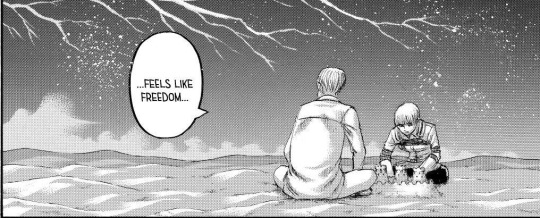
Indeed, Levi perceived freeing Erwin of the control of his id as a mercy.

Ymir smiles as she gains the strength to leave her love behind, and Mikasa, though in grief, bears a very peaceful expression after she overcomes her id desire to protect Eren.


And as Mikasa comes to free Eren of his id desires, his eyes seem to be smiling.

So Eren does accomplish freedom at the end, for himself and the rest of the world alike.
The rest of the world is free because, despite still being riled up in political turmoil, it has been liberated from the titans. The pure titans are driven solely by id, as they possess nothing but selfish desire at the expense of others. It is the progenitor of this unrestrained id which is the story’s true antagonist.
By Zeke’s description, the titan worm is practically the incarnation of the id drive itself. It evolved solely to fulfil the instinctual objectives of ‘life and multiplication at all costs’ that Zeke decries.

Therefore, a series about the importance of restraining one’s id with one’s ego could only end with the defeat and disappearance of this incarnation. The rational and moral voices of the Alliance, and of Eren’s better self, conquer the destructive self-satisfaction of the worm.
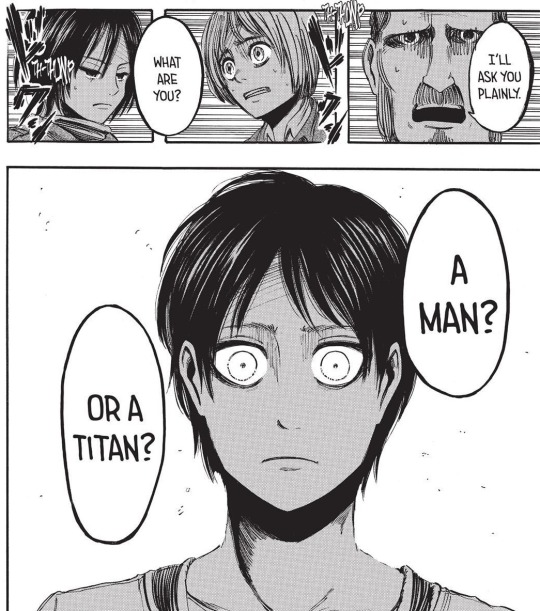
This is the central question of both Eren’s character and the series as a whole. Will the ego that makes up your humanity triumph, or will it be the monstrous id represented by the titans? It’s an idea inherent in the very premise of the manga: can humanity defeat the titans? The ending tells us that it can indeed.
Yet without the titan worm, Eren’s plan and the subsequent victory of humanity would never have been possible. In the manner of Eren planning out his own demise, the id must be directed towards its own destruction. This is how Isayama recommends we use our violent and obsessive urges.

Using the id for other purposes is what created the central conflict of the series in the first place, i.e., the titans. Both Eldia and Marley became too invested in the power their id gave them, and Eren had to step in to remove it before the two nations ground the whole world to dust.
The central theme of the ending is reflected in the change of Isayama’s attitude to the story. Like Eren, there was a part of him that genuinely wanted to destroy the world, that wanted to hurt people. He mentions this in the 2014 Brutus interview:
Would you say part of you wished the world would be destroyed?
What, like, “Screw the world, let it all go to hell”? Yeah, I used to really think that quite a bit — like, I’d wonder what it would be like to live in a world without people, like in I Am Legend.
And in the Final Exhibition interview:
I think I wanted to attack something. Like betraying people or hurting people. And, well, it's not exactly nice, but hurting the readers too... In all honestly, I feel that's what I really wanted to do.
However, he ultimately renounced that desire in the name of responsibility towards others. He left his fictional world partly intact, and tried to give the readers a happier conclusion. The moral conscience of the ego conquered the selfish and violent urges of the id. As he says in the 2017 Bessatsu Shonen interview:
Although I’m progressing towards the ending that had been set before, my approach towards the ending itself has changed from the original plans. Because now I feel responsible towards the reader.
Whether he made the right choice is very much up for debate. But in my opinion, if these themes of id and ego were what Isayama was angling for, then the ending is justified. There are still narrative problems and loose ends (Historia’s arc, for instance), not to mention issues of tone and execution. But thematically, I am satisfied. I only wish the ending had made these themes clearer: subtlety’s all well and good, but you shouldn’t need this heavy of an analysis to make sense of a story’s conclusion.
If you enjoyed reading this, you might be interested in these metas too: ‘Life without the Will to Life’ and ‘Levi, Erwin and the Decision to Die’. The former analyses the series’ presentation of the id through the lens of Schopenhauen philosophy; the latter delves more into how the id acts as a foreign, controlling force, particularly with regard to Erwin.
#shingeki no kyojin#snk meta#eren jaeger#mikasa ackerman#eremika#erwin smith#ymir fritz#himeanole#sigmund freud#snk spoilers#aot spoilers
324 notes
·
View notes
Note
I hope you don't mind me sending another ask! Haha. I just love reading your thoughts :) No pressure to answer everything I send
What do you wish we had gotten more of in AoT?
Could be related to Levi, but could also be more generally related to other characters and/or world-building as well.
Personally, I wish we had gotten more Levi and Mikasa interactions, as well as more Ackerman lore in general and more about the Underground and Levi's childhood (super excited for the Bad Boy volume). I would have also loved more character-focused chapters/episodes amidst all of the plot-driven chapters—like seeing how Hange and Levi grieved Erwin and the rest of the Scouts after reclaiming Wall Maria. It would have also been interesting to see some of the Levi and Zeke interactions during their month together in the forest
Hi again, and no worries at all about the asks! I like receiving them, truly.
I'm actually really satisfied with AoT. I know a lot of people always find one or two things that they didn't like, or that they complain about. Obviously, since it's such a plot heavy story, with a lot of overarching themes, there wasn't a lot of time for, as you said, "character" moments, or I guess what some might call filler episodes. Although I feel like we did get plenty of moments which told us a lot about who every character was. Isayama has a lot of subtlety in his writing, and I think you really have to pay attention to understand what's going on and what's being said. But it's also not ambiguous, really, if you do pay attention.
With that said, I would love to have seen more background on a lot of the different characters, for sure. I understand why it wasn't possible, though, again due to the complexity of the plot and the possibility of distracting from that by spending too much time delving into things like backstory, etc...
I've read some fantastic fanfic that really delves into what Levi's life was like when he first joined the Scouts, and I think that would have been really cool to get to see more how Levi adjusted to such a different life from what he'd known. People talk a lot too about wanting more background on Hange, and that would have been nice to get as well. Getting more background on Erwin too, or any of the more minor supporting cast, like Mike or Nanaba or Petra, etc.... I know a lot of people aren't happy with the way Historia's ending happened either. I think a lot of those complaints come from people expecting Eren to be the father of her child, and then being pissed when that didn't pan out, so they accuse her arc of being unfinished. But I think it felt pretty complete. What else were we supposed to find out about her?
I guess that's what fan fiction is for, though, haha. Getting to explore different scenarios and aspects which weren't covered in the actual story.
With that said, I feel like we're extremely lucky to be getting an extra story about Levi. One thing I would really have loved to see was more of everyone's lives after the war. But of course, that's post main canon, and the story could have gone on indefinitely if that were the case, haha. But I'm hoping we get to see a little of Levi's life with Gabi, Falco and Onyankopon, along with more on his childhood, obviously. Either way, I'm just grateful to be getting anything extra at all from Isayama. I don't understand people who are complaining about it. Like, damn, he doesn't owe any more content to us, but he's got an extra story he wants to tell about one of the most important characters in the whole thing, and people are STILL whining that it's not what they want. People are so ungrateful sometimes.
8 notes
·
View notes
Text
ok mandatory how to find my rambles post

I am an insufferable idiot, you have been warned.
This is a multi-fandom blog that has been taken over by Jujutsu Kaisen and CLAMP, but I will also post about other animanga I love.
I liveblog for the Jujutsu Kaisen manga. You can find my posts in one of the following ways:
in Tumblr’s search box, search for “jjk ch + chapter #” i.e. jjk ch 173. I should have posts for most chapters starting with chapter 157
For anything before that, I sort of summarized chapters 1-157 in this manga index that I haven’t updated or finished because I am lazy
You can also go through my tag god I love jujutsu kaisen. this is probably the best way to find my liveblogs and any non-chapter specific meta. hopefully Tumblr won’t fudge it
My CLAMP tags are a little bit all over the place but I typically tag under the series’ title or dammit seishiro why can’t you just be normal? and clampism is a mood.
Asks tags: ask the mental gymnastics anime girl (most recent) and a to the q! (the original tag before I became known for the mental gymnastics).
Anime/manga recommendations: #my anime box
More links under the cut...
I’ve also written “meta” or more like shameless shippy posts about:
Terror in Resonance
Gundam Seed
Soul Eater
Tsubasa Reservoir Chronicle
Tokyo Babylon
Sankaku Mado no Sotogawa wa Yoru
Attack on Titan
More randomness about me below the cut...
I love writing + I love Psychology + I love anime/manga
Also, I’m opinionated and try not to take myself seriously. It’s a work in progress and it starts with self-acceptance.
Basically I ramble a lot and am a massive dork.
Since I have an academic background in Jungian Psychology you will see me write a lot about Archetypes in anime and manga, common tropes, and symbolism.
Therefore sometimes I wonder whether my username shouldn’t be...
theanimeliterarynerd
theanimedork
or a variation of the sort...
Oh well.
You can find the working list of the manga I’m currently reading under Subaru.

Currently reading:
Jujutsu Kaisen by Gege Akutami
Haikyu!! by Furudate Haruichi
Saezuru Tori wa Habatakanai by Yoneda Kou
Attack on Titan by Isayama Hajime
Spy X Family by Endo
Chainsaw Man by Fujimoto
Reading queue:
x/1999 by CLAMP (re-read)
CSM2 by Fujimoto
You can find the working list of the anime I’m currently watching under Megumi.
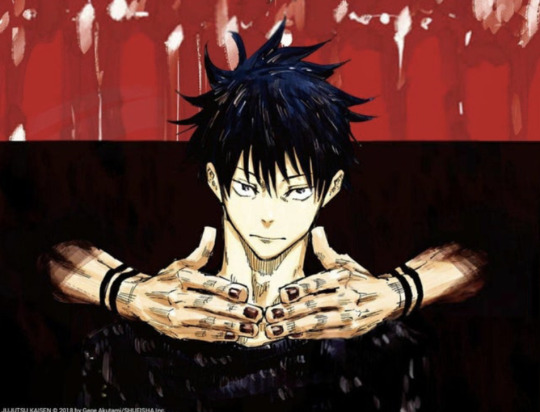
Currently watching (not currently watching seasonal shows)
FLCL
Stein’s Gate
Watching queue:
Fate/Zero
Code Geass
Maybe someday I will finish watching:
Neon Genesis Evangelion
Inuyasha
Eagerly waiting for:
Haikyuu!! season 5
Jujutsu Kaisen season 2
Wotakoi: Love is Hard for Otaku season 2/movie
Kaguya-Sama: Love is War season 3
Made in Abyss season 2
Recently finished:
Reading Tokyo Ghoul:re
Favorites
Mangaka (no specific order):
CLAMP
Gege Akutami
Isayama Hajime
Furudate Haruichi
Anime movies (no specific order):
Your Name
Millennium Actress
Anime (no specific order):
Showa Genroku Rakugo Shinju
Zankyou no Terror
Sonny Boy
Jujutsu Kaisen
Haikyu!!
Made in Abyss
Manga (no specific order):
Jujutsu Kaisen
Tokyo Babylon
Tsubasa Reservoir Chronicles
Characters (no specific order):
Fushiguro Megumi from Jujutsu Kaisen
Sumeragi Subaru from Tokyo Babylon, X1999 and Tsubasa Reservoir Chronicles
47 notes
·
View notes
Text
So it was a love story after all
One of the things that has been said over the years about Attack on Titan is that it had no romance. Isayama, was the general consensus, didn’t write a love story. AOT is not about ships. It’s about the nature of humanity, about hatred, about racism and the will to survive. It’s got its roots in Norse mythology, in real life events from the recent past and a more ancient past. But love and romance, so everyone thought, never had a place in this story.
How wrong we all were.
As it turns out, Eren’s motivation for everything he did was always his eternal and undying love for Mikasa.
Here’s where I stumble.
I never saw any convincing signs of Eremika in this story. I didn’t like their dynamics in the first place – Eren seemed annoyed with her a lot of the time, or at best consider her his adopted sister – and what really rubbed me the wrong way during the entirety of the story was Mikasa’s unhealthy obsession with Eren. Yes, he saved her, and yes, she’s an Ackerman, who are known for their intense bonding to their host (although this was a false assumption as well, according to Zeke), but her obsession was unhealthy and annoying to the point that I was unable to see her character development or her actions.
Her looks didn’t make her special to me (contrary to a lot of male fans I encountered on social media and irl), to me she was just one of the characters, albeit a rather uninteresting one, so I wasn’t paying as much attention to her as they did – we all pay most attention to our favourites (which in my case are Eren and Levi and to a lesser extent Hanji and Connie), and as a result I may have been blind for any character development she had.
Maybe it’s because I’m a woman and I feel like she’s one of those poorly written -“the man is my only goal in life” -women. Women who in a story solely seem to exist as an appendage to the main character and have no life or will of their own. Eren and Mikasa were, in my opinion, never equals in this story.
I know many people do see Mikasa’s character development, and do see meaningful interactions between Eren and her, but I’m sorry, I can’t see them unless I use a microscope, and I think this is the main flaw in Isayama’s writing: with all the twists and foreshadowing (which I so thoroughly enjoyed), some hints he left are way too small, while some of his red herrings are too in your face to ignore.
It also feels like Isayama changed the ending too often and forgot about a lot of foreshadowings along the way.
This is why it feels that we’re left with so many plot holes – if you read closely, there aren’t many, but the red herrings were sprinkled so abundantly throughout the story that we may have expected way too much. The origins of the Ackermans, the importance of Historia’s’ baby and “who is the father”, Zeke’s presumed 4D chess and Eren’s 5D chess, the Underground cities as protection against the rumbling, what caused the titan forest trees to grow so large, what happened 854 years ago in the year 0, Reiner heavily being foreshadowed to become the new Helos, what is the Hallucigenia thing, where did it come from and how does it create titans, where did Ymir’s first titan come from if there was no one in PATHS yet to build it – we don’t need all these answers, but somehow Isayama made us believe there was more to this than there actually was, and that’s why many of us feel robbed of the ending we wanted or expected.
The Historia storyline bothers me the most. The dynamics between her and Eren were much more interesting and realistic than those between Mikasa and Eren. To begin with, they were equals. Whatever happened, they always had each other’s backs. So it made sense to me that Eren had at least something to do with her choice to have a baby, especially because he was so vocal against it. Instead, she too married a guy who hadn’t been particularly nice to her in the past and nothing of it had anything to do with Eren or his plans, or their shared memories of previous founders.
Parallels between OG Ymir and Historia seemed abundant, but apparently, in the end, we were supposed to see an essential parallel between Ymir and Mikasa. Her Stockholm-syndrome-love for the first King Fritz felt like a sort of deus ex machina (and yes, if you reread chapter 122 there were hints, but so scarce, so small, that they didn’t seem to hold much significance).
I find the fact that OG Ymir needed to see someone break loose from the clutches of obsessive love in front of her own eyes to finally break loose from her own love for Fritz a bit far-fetched, especially since I consider that this is what the entire story hinges on.
(Now we do understand why Isayama had Levi so severely wounded in chapter 114 (the explosion). Had he been fit, then he had most likely been the Ackerman who killed Eren (because this has been foreshadowed too, multiple times) – and that wasn’t supposed to happen. It had to be Mikasa, or else OG Ymir wouldn’t understand how to break loose from her bond.
Another thing that bothered me was Eren’s sudden confession of his love for Mikasa to Armin. Like I said, I found the Eremika dynamics particularly uninteresting, so this confession felt very unnatural and far-fetched to me – but, again, this is what the entire story is built upon.
He does what he does for them, specifically for her.
It’s actually kind of sad that some fan theories were better/more interesting than the canon ending, but Isayama is the creator of this story and we’ll have to accept his ending – I do know that the more I’ve been rereading the final chapter, the less it bothers me how the story wrapped up. I might even come to like it, and when I reread the full story (which I will certainly do, I LOVE this story) I’ll pay more attention to the small hints Isayama sprinkled between the lines for us about the love Eren felt for Mikasa, to see if his words in 139 will finally make sense to me.
For now, Eren’s motives don’t feel real or grounded. If he’d cried about the millions (billions?) of deaths he’d caused instead of about Mikasa, it would have made more sense in the grand scheme of things. He’d cry for the lives he’s taken, and for the realisation that it has all been in vain, because the ones he tried to protect so that they can live long and happy lives, will now be consumed with grief and survivor’s guilt.
Still, could any of this have gone differently?
No.
Eren was rightfully desperate when he, from behind the bars of his cell, yelled at Hanji if there was another way. Because there wasn’t.
The irony was that Eren always fought for freedom, but all his life he had been a slave to his own destiny. He was unable to change the future, and could only try to influence it. Or else, as Kruger said, this cycle would repeat itself, again and again.
All in all I feel there was more to this story than what we got, it could have gone deeper, more foreshadowing could have paid off instead of being a red herring.
A bittersweet ending
Levi surviving and finally getting closure with the knowledge that this was what all of his old SC friends died for, brought me to tears. And that smoke, was that the disappearing of his Ackerstrength?
The frame where he travels the world with his carers/adopted children Gabi and Falco and his new best friend Onyankopon (friend? lover? just look at that glance they share) made me so happy that this is now the desktop background of my laptop.
(I hope they’ll travel to the AOT equivalent of the UK so he can finally enjoy some decent black tea)
To me, at least this part was sweet. The rest: bitter, even the fates of the Alliance members. This is a story with an open ending. We don’t know if they’ll succeed on their peace mission, we don’t know what the Yaegerists will accomplish, we don’t know what the rest of the world will do; all options are open again, but maybe that is the point. Eren never meant to end the hatred, there’s no fighting the nature of humans. Erwin knew this already: mankind won’t stop fighting among themselves until there’s only one person left.
Eren’s goal was to end the titan era, and at the cost of his own life and that of 80% of humanity, he succeeded.
Learning that Eren, who held freedom in such high regards, was a slave to his own destiny all along was painful and ironic, but in a way he lives on as a bird, finally free, finally Vogel aus dem Käfig.
Thank you, Isayama.
#snk#aot#snk meta#eren yaeger#snk spoilers#snk 139#snk 139 spoilers#mikasa ackerman#levi ackerman#eremika#shingeki no kyojin#attack on titan#aot 139#long post
91 notes
·
View notes
Note
i knew when it was announced that the manga was on its last leg that i’d come to miss it, but this emptiness of waiting for the monthly releases only to remember it’s over and there’s nothing but the rest of the anime now left for us to wait for is making me sad. this manga has been my hyperfixation for like 7 years.
i really hope snk ends up having a renaissance in a few years once we have fully digested how it ended, and i hope the success it had might inspire some spin-offs, especially for the veterans as they were the real reason i stuck it out to the end.
i would enjoy seeing hanji’s background and adolescense. i’d love to see erwin struggling to let go of the pleasantries of life to dedicate himself fully to the corps, namely his break up with marie. i’d LOVE to see the aftermath of isabel and farlan dying, and levi having to conform to his new reality as a fully realized soldier.
i’m not really ready to let go yet ;__:
Ah I'm sorry you feel like that Anon. It's always sad when a much loved series comes to an end, particularly when the ending causes such mixed emotions, so you definitely have my sympathies there. But at the same time, once a series is over, fans can really take the characters as their own, and create all the stories and scenarios that they could only have wished for in canon. Given the complexity and ambiguity of the world and characters that Isayama created, I suspect the fandom will still be going strong, with writers and artists creating all kinds of content, for years to come, so I hope you won't have to let for for quite some time yet.
You're not alone in desperately hoping for some spin off stories featuring the Veterans. I sell my first born* to see some side stories that fill in the gap between the end of ACWNR and the beginning of the manga; Hanji's back story, Erwin dealing with the aftermath of his father's death and pursuing his dream while rising through the ranks, Levi coming to terms with his new life in the Survey Corps and slowly learning to trust Erwin. So much happened in that period and I want to see it all! We've already been blessed with some amazing fics that cover this period, but it would be really cool to have some official content too. I guess the closest thing we have at the moment are the Smartpass stories.
The only thing I might leave off your list is Erwin breaking up with Marie, as I'm not sure they ever really had a relationship to break up. Given that we know from a Smartpass story that Erwin helped Nile to write love letters to Marie, I've always assumed that in Erwin's case, it was more of a youthful crush that he never really pursued. Still, it would be amazing to learn more about Erwin's time as a cadet, the relationships he forged and his decision to join the Survey Corps. We can but dream!

* My first born is now considerably bigger than me so this may be easier said that done!
33 notes
·
View notes